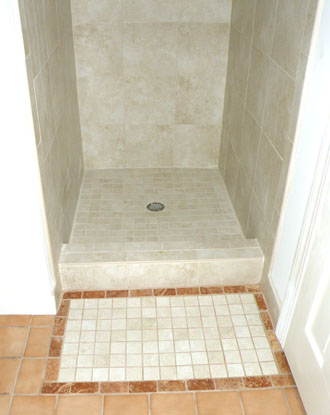
Household water softeners use an ion exchange process to replace excess calcium and magnesium with the ions of sodium or potassium to provide you with soft water for different uses. The Bathroom water softener is easily attached to the source of water supply so that you get soft water for all your work. Using a softener ensures that hard water doesn’t cause any more damage. Here are 3 easy ways to get rid of hard water stains from your bathroom, listed below: But not anymore, this blog will give the magic potion to clean those hard water stains. Stubborn stains are always a pain, that too if you find them in your bathroom, you will surely not love it and they are a big challenge to clean.
#Bathroom shower tile how to#
How to Clean Your Bathroom Tiles & Floor from Hard Water Stains? So, what should be done to curb these problems? Read on to get a solution. This layer has the potential to irritate the skin.

White Spots: There is a famous quote, “morning shows the day”.You will also notice tiny, dried water spots on your washbasin.


The excessive mineral content in hard water leaves its residues behind resulting in clogged drains and pipes. Clogged drains: Did you notice that your washbasin drain is not functioning properly? The reason behind this is hard water.And that is also evident with tiny, white stains lying all over the showerhead. But wait, this is actually because of the calcium and magnesium sedimentation in the shower nozzles. You may decide to call the plumber to fix it. Clogged showers: You may notice that usually, after a point of time, your shower stops releasing the amount of water it used to before.So, before going ahead with what should be done to clean the hard water bathroom stains, we should all be aware of the possible stains and the threats caused by hard water in the bathroom. And you will require more water to cleanse that sticky watery feel from all over your bathroom. It can block your water wipes, it can lower the efficiency of bathroom appliances, and even can make your soaps, shampoos, and detergent work less effectively. Eventually, you end up with a layer of hard water deposits and dirt, leaving brown stains all over the bathroom. When you don’t clean the deposits on a regular basis, every time you shower, the dirt particles mix with fresh mineral crystals. This ultra-thin coating, which comprises calcium and magnesium is initially invisible on the surface of your bathroom. When the water in your bathroom or any other area evaporates, it leaves a very thin coating on the bathroom tiles.

Why Does Hard Water Leave Stains?Ī high concentration of calcium and magnesium makes water hard. Read on to find out some easy ways to get rid of hard water stains from your bathroom tiles. If you too are facing a similar situation, the blog is for you. No matter how expensive cleaning products you use, removing these stains is next to impossible. The reason is bathrooms hold a lot of standing water on a daily basis. Moreover, the brown stains on bathroom tiles not only steal away the aesthetic appeal of your bathroom but are also difficult to remove. These deposits are initially undetectable to the human eye, but if left unattended, they will layer over time, producing ugly dark stains on your tile and/or grout. Hard water coats your shower tiles with an Iron and Calcium deposit. This can affect everything from your appliances and plumbing to the tile and grout in your bathroom shower. Hard water causes build-up on the faucets, showers, and sinks and over time leaves ugly stains on the bathroom tiles.


 0 kommentar(er)
0 kommentar(er)
